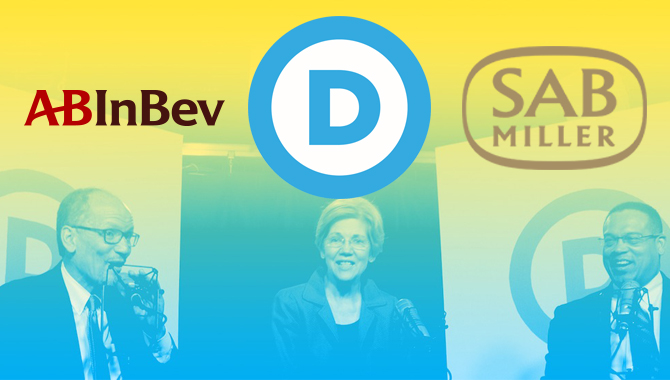
Could craft beer play a role in the next congressional election? As part of its effort to win back control of Congress, the Democratic Party plans to “crack down on corporate monopolies” as part of a new populist economic agenda, unveiled Monday.
The platform – called “A Better Deal” – is partly aimed at preventing mega-mergers that would “harm consumer, workers and competition.”
“A Better Deal is not just our slogan, it is our mission,” Senate minority leader Chuck Schumer of New York, said Monday during an unveiling of the plan in Northern Virginia.

It’s also a swipe at “MegaBrew:” in a document outlining how the “Better Deal” plan would curb corporate consolidation and level the playing field, Democrats specifically named the beer industry, pointing to last year’s $107 billion merger between Anheuser-Busch InBev and SABMiller as a segment where M&A has not been more closely scrutinized.
“As of 2016, five breweries controlled over 50 percent of global beer production, compared to ten companies in 2004,” the party wrote. “Although there is a burgeoning craft brewery industry, these small businesses are under threat from large legacy brewers that are acquiring their craft competitors or trying to block craft brewers’ access to the marketplace.”
The document went on to explain some of the negative repercussions of allowing A-B InBev, the world’s largest beer company, to purchase SABMiller, the world’s second largest brewery.
“The companies have already announced that jobs will be cut as a result of the merger, and the resulting conglomerate will make it even harder for small, local breweries to compete,” the Democrats wrote.
Under A Better Deal, regulators would be required to “review mergers after completion to ensure they continue to promote competition,” and new standards would be implemented to “limit large merger that unfairly consolidate corporate power.”
“Currently, it is too easy for companies to unfairly harm competition by merging, squeezing competitors, workers, customers, and suppliers,” the Democrats wrote. “Today, antitrust regulators and other federal oversight authorities can only consider the narrow, short-term effects of a merger on price and output, and have the burden of proving that consolidation would be anticompetitive. We propose establishing new merger standards that require a broader, longer-term view and strong presumptions that market concentration can result in anticompetitive conduct.”
When the DOJ approved the merger last July, it required A-B InBev to divest SABMiller’s 58 percent ownership stake in MillerCoors (a U.S. subsidiary) while simultaneously barring the world’s largest beer maker from “instituting or continuing practices and programs that disincentivize distributors from selling and promoting the beers of ABI’s high-end and other rivals.”
At the time, the DOJ also limited the company’s ability to purchase independent wholesalers, and later said it would “carefully scrutinize any future craft acquisitions.”
Shortly after MegaBrew was approved, the DOJ investigated A-B InBev’s purchase of Virginia-based craft brewery Devils Backbone. The DOJ concluded that investigation in September when Deputy Assistant Attorney General Juan Arteaga determined that the “competitive implications of ABI’s acquisition of Devils Backbone are too uncertain at this time to warrant further investigation.”
Following the acquisition, however, A-B InBev purchased two more craft breweries – Texas-based Karbach Brewing and North Carolina-based Wicked Weed. The company, via its ZX Ventures “disruptive growth organization” has also since made a number of investments into companies that operate within the beer space, including beer ratings site Ratebeer.com, Radler maker Owl’s Brew and homebrew companies Northern Brewer and Midwest Supplies.

Under the Democrats’ proposed plan, however, tougher post-merger reviews would be enforced.
“Today’s regulators have limited ability and resources to monitor whether these conditions are being met after the deals are completed,” they wrote. “In addition, in the 21st century economy fueled by rapidly emerging technology, the economic circumstances that may have made a merger competitive at the time it was reviewed can quickly shift.”
The Democrats have proposed requiring “frequent, independent reviews of mergers and ensuring additional resources are available to conduct the reviews,” as well as the creation of a “consumer competition advocate” office that would “research current market activity, receive consumer complaints, and proactively recommend competition investigations to the Federal Trade Commission (FTC) and the Department of Justice (DOJ).”
In response to the Democrats proposal, an A-B spokeswoman shared the following statement with Brewbound.
“AB understands and respects Sen. Schumer and Leader Pelosi’s focus on improving opportunities for American workers. As an American manufacturer that directly employs over 17,000 U.S. employees and indirectly supports tens of thousands more jobs, it is a goal we share.
However, the concerns raised about our company’s transaction with SABMiller do not reflect the facts. In that deal, AB did not acquire any new assets in the U.S. from SABMiller because all U.S.-based assets were divested. The deal was about gaining access to fast-growing markets around the world—access for our existing brands including iconic American brands like Budweiser. Our position in the U.S.-market did not change at all as a result of this deal, and, therefore, it is inaccurate to suggest that this deal in any way affected competition in our industry. The fact is that today the American beer industry is more competitive than ever before with over 5,300 breweries in operation and more opening every day. We welcome that robust competition, as well as all efforts from both parties to ensure that a growing economy benefits workers nationwide.”